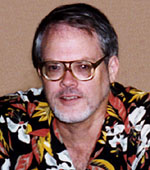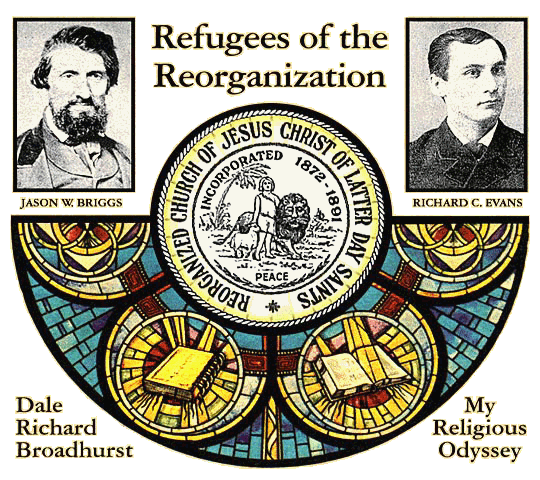|
Welcome to Dale R. Broadhurst’s Restoration Pages “Refugees of The Reorganization” |
 E-mail your comments |

|
RESTORING THE GOSPEL:
In April of 1830 a small congregation of religionists who called themselves the "Church of Christ," formally organized their group at Manchester, New York. In many of its superficial aspects this new church greatly resembled existing Christian denominations of its day, such as the Disciples of Christ and the Methodists. But in other, more substantial ways, the church was fundamentally different from any other organized religious body. From the very beginning its members claimed the Church of Christ to be a modern restoration of the apostolic religion practiced by the disciples of Jesus the son of Mary. The members affirmed that they were restoring "the faith once given to the saints" and bringing the fulness of the gospel of Jesus back to earth, after its having been largely forgotten and ignored by mainstream Christianity over the course of many centuries. In fact, the people who founded the Church of Christ claimed to be the modern continuation of those saints of former days, complete with all the gifts, powers, blessings and authority reportedly invested in those first apostles and disciples.
The leaders of the Church of Christ also claimed that their publication and preaching had restored the Gospel of Jesus. They claimed their preaching was carried on under his latter day commission, containing his modern message, and practically under his direct supervision. Although their explanations of exactly what constituted the Gospel were not always very definite, those same Latter Day Saint leaders clearly reserved the right and privilege of preaching and teaching the "Restored Gospel" to themselves and their obedient followers: "those to whom these commandments were given might have power to lay the foundation of this church... the only true and living church upon the face of the whole earth" (RLDS D&C sec. 1); "it shall not be given to anyone to go forth to preach my gospel, or to build up my church, except he be ordained by some one who... has been regularly ordained by the heads of the church" (RLDS D&C sec. 42). Although these claims to exclusive authority were made early and with much seemingly pious zeal, not every body who heard them came away convinced that the Latter Day Saints were the only heaven-sanctioned professors of Jesus' Gospel. In fact, most early auditors of what came to be called "Mormon" preaching, did not accept the extraordinary claims of Church of Christ's leaders.
The public preaching of the early Latter Day Saints was founded upon a five-point, "first principles" system, practically identical to that promulgated by the Campbellites -- namely: Faith, Repentance, Adult Immersion, Remission of Sins, and Bestowal of the Holy Ghost. Of course the "faith" required of new converts was their assent to Mormon tenets, and the required "repentance" could only be rendered unto a Latter Day Saint Elder. Such extremely exclusive claims to religious authority were not well received by many Christians at the time of the church's organization. The Church of Christ further distanced itself from surrounding denominations and sects by claiming to have received new, divinely-inspired scriptures, a restored biblical priesthood and a unique covenant relationship with the God of Israel. Coming from this background and responding to what they perceived as a divine calling to "bring forth and establish the cause of Zion," the Latter Day Saints have ever since been a peculiar people -- a people very much in the contemporary world, but not always of that world.
Rather than focusing on the extraordinary experiences of this "restoration movement," I'll simply state that I was, for most of my adult life, a member of one of its modern branches: Community of Christ, (formerly known as the Reorganized Church of Jesus Christ of Latter Day Saints). During the years I spent in that denomination (some may call it a sect or a cult), I often reflected upon the question: "Just what is the Gospel of Jesus?" The more I pondered that query, the more convinced I became that, whatever the "good news" of Jesus might be, it was not restored in 1830 and its "fulness" is not made manifest within the pages of the Book of Mormon. So far as I am able to communicate my own realizations on this important point, I can only say that Mormonism has asked the right question, but delivered its adherents the wrong answer. Within the broad tradition of the "restoration movement" so loved and advocated by my ancestors, I have always thought that the RLDS Church provided the last, best hope for the Latter Day Saints. If the reader intends to be a "Mormon" of any stripe, I still point him or her in the direction of Independence, Missouri's Community of Christ. One can do worse than fellowshipping there -- but, perhaps, like myself, others will find the spiritual answers generally provided by that group are the wrong answers. For me, at least, the "Restored Gospel" is a fallacy and a fraud. I am much more interested in our discovering and "restoring" Jesus' original gospel, than I am in buying into (or selling) any canned, boilerplate system of Gospel Doctrine.
In 1998 the leaders of what was then still called the RLDS Church announced a five-point program to bring the denomination into the 21st century. The fifth point on their list -- to articulate a Christ-centered theology -- was no doubt the most intriguing and promising goal of the now moribund "Transformation 2000" effort. The church's leaders, despite all their best intentions, faced a dilemma. Any attempt to hand down a Christ-centered religion from the top ranks of "The Quorums" was but another in a long string of Joseph Smithisms -- those sorts of ham-handed attempts at reform from "on high" which the RLDS leadership had long before realized did nobody any good. In the end, the philosopher kings of Independence quietly laid aside the Christ-centered theology, and left the much needed spiritual reform to another time and another generation. At least they did not repeat the farce played out by the equally philosophical kings of the World Wide Church of God. As some wags may say, you can lead a church to the Living Water, but you can't make 'em drink. The result of all of this delay in responsible prophetic ministry is a Community of Christ still firmly grounded in the 1830 testimonies of the "Three Witnesses" and the "Eight Witnesses" -- a not too enviable collective purgatory for any self-proclaimed bunch of Jesus followers, much less for a truly inclusive covenant community, professing to be seeking the will and way of Israel's God.
It has been suggested -- by no less learned authority than myself, by the bye -- that dissident Latter Day Saints have a responsibility to remain within Mormonism, or within the Reorganization, or within Community of Christ, and there work for the common good. We each are called to some type and degree of ministry, and what better place to carry on that spiritual ministry than among good-hearted folks who are open to God's continuing revelation and guiding hand? It is a course of action that I still recommend for many. The "reform" wing of the Reorganized Saints (Communicants of Christ? -- Communitarians?) has always played a much needed role among what used to be called the "One True Church." It is very much due to their tireless efforts, over several decades, that the Mormonite moniker, "True Church," has at last faded into the oblivion of restoration branch liturgies. It is not an easy job, bailing out the good ship Restoration, with a teaspoon in a typhoon. And, alas, it is a task I'm now happy to leave to younger, more liberal souls -- but not without some lingering traces of ministerial guilt. Herman Melville has his alter ego preacher reveal some similar thoughts, thusly: "Shipmates, God has laid but one hand upon you; both his hands press upon me. I have read ye by what murky light may be mine the lesson that Jonah teachers to all sinners, and therefore to ye, and still more to me, for I am a greater sinner than ye... How being an anointed pilot prophet, or speaker of true things, and bidden by the Lord to sound these unwelcome truths in the ears of a wicked Ninevah, appalled at the hostility he should raise, fled from his mission, and sought to escape his duty to his God by taking ship at Joppa. But God is everywhere; Tarshish he never reached."
If I might be so bold as to play the part of just one voice, out of the midst of a "prophetic people," I would deliver
unto the leaders of Community of Christ a small piece of sage advice: "Don't wait forever, the truth in Zion to tell."
God has laid but one hand upon the members; but both His hands press upon you. If the past has taught us anything, it
is that temples come and go. Sadducean priests and philosopher kings slip down to their graves and are replaced with
short-remembered epitaphs. But God's people continue onward, generation after generation and nowadays they deserve
some better guiding light than an RLDS "3-in-1," thoughtlessly thumped down upon the pulpit, Jeff Lundgren-style, to
a slumbering congregation. If there really had been a Samuel the Lamanite, and if he appeared in Missouri today, I
believe his message would be: "Tell the truth, O ye Elders of Israel -- for truth is mighty and shall prevail!"
Although I consider Restoring the Gospel to be the primary purpose for my on-line contributions, I've so far devoted only a small fraction of my space on the web to religious evangelism and apologetics. What you will mainly find at my web-sites are reference materials for your own exploration of various areas of "Mormon" interest, along with a few personal artifacts resulting from my research into the "restoration story." If you have some interest in Solomon Spalding, Book of Mormon origins, old articles on the Saints, etc., feel welcome to explore my varied on-line offerings. I hope that the material I present will be useful both to those within the Latter Day Saint restoration movement and to those who are only curious about what it is and where it came from. Dale Richard BroadhurstFeb. 1998 -- rev. Dec. 23, 2005 web-pages currently under construction: Restoration Scriptures & Theology The Saints in the 21st Century Spalding Studies |
SidneyRigdon.com | OliverCowdery.com | SolomonSpalding.com | Old Mormon News | Home
last updated: Apr. 21, 2006






